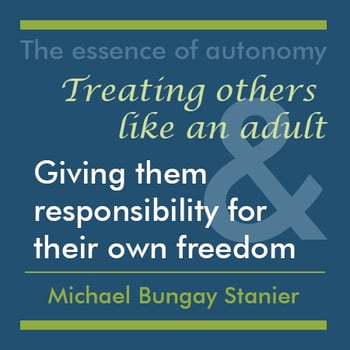 The first three questions of The Coaching Habit: Say Less, Ask More & Change the Way You Lead Forever that are discussed Kickstarting a Coaching Session, Coaching with the AWE Question, and The Coaching Habit of Creating Focus, work together to create focus and define what the client sees as the central problem. As we have discussed earlier, it is tempting to believe that your work is primarily done once the problem is solved. The Advice Monster will see a clear definition of the problem as an opportunity to solve it, look brilliant and move on to the next problem. No patience, process or angst required. Most of us went into this field due to our passion to help others. Somehow along the way, we learned that helping others means attempting to solve problems for them. Well intentioned but well off the mark. “What is the real challenge here for you?” isn’t the beginning of the end, it is the end of the beginning. The first half of the coaching process is defining the problem. The second half is identifying the solution. That process begins with a simple (but not easy) question?
The first three questions of The Coaching Habit: Say Less, Ask More & Change the Way You Lead Forever that are discussed Kickstarting a Coaching Session, Coaching with the AWE Question, and The Coaching Habit of Creating Focus, work together to create focus and define what the client sees as the central problem. As we have discussed earlier, it is tempting to believe that your work is primarily done once the problem is solved. The Advice Monster will see a clear definition of the problem as an opportunity to solve it, look brilliant and move on to the next problem. No patience, process or angst required. Most of us went into this field due to our passion to help others. Somehow along the way, we learned that helping others means attempting to solve problems for them. Well intentioned but well off the mark. “What is the real challenge here for you?” isn’t the beginning of the end, it is the end of the beginning. The first half of the coaching process is defining the problem. The second half is identifying the solution. That process begins with a simple (but not easy) question?
This question is so foundational to the coaching process that it is called….(wait for it….) The Foundation Question. Hats off to The Coaching Habit author Michael Bungay Stanier for being clear and concise and speaking plain English (even though he is from Australia and lives in Canada). Speaking of plain talk, it is surprising how difficult it is for people to answer the Foundation Question: What do you want?
One of the primary principles of Motivational Interviewing is respect for the client’s autonomy. Autonomy is defined as “the right or condition of self-government” or “freedom from external control or influence.” Bungay Stanier’s summarizes the essence of autonomy as “treating others like an adult” and “giving them responsibility for their own freedom.” So, why is answering the question, “What do you want?” so darn hard for people. They will hint at what they want. They will provide examples. They will ask what is reasonable in this situation. But just stating, “I want X” is unusual.
Is it because we never actually feel like adults and are concerned that someone in power will snap back that we are being selfish and immature? Are we stuck in the view that we are a child who has wants but explicitly stating them makes a failure to meet them more real and more painful? Have we learned the cliché, “Happiness is not having what you want, but rather wanting what you have?” too well. Perhaps each of these explanations, and others, contribute to our difficulty with such a simple question, but if there is ever a time to answer a question directly, it is when you are directly asked, “What do you want?”
Why am I so focused on the reasons that people don’t typically really answer this question when you are more likely to be the asker than the askee? Because the relationship you have developed with the person up to this point will primarily determine whether they skirt around the question or give you a clear answer. By the time you ask, “What do you want?”, the client will already have an opinion as to whether there is an acceptable response for you. They will have already determined, very early in the relationship, whether you have an agenda and are asking questions to mask that agenda and impose your values rather than expose their values. In other words, the client will know whether you are there to empower their autonomy or to subtly manipulate them into seeing the world as you should (i.e., as they do).
If you find yourself horrified and in disbelief to a client’s response to the question of “What do you want?”, your agenda and Advice Monster are fully engaged. Of course, sometimes clients will throw out an idea just to test whether you will support their autonomy and trust that they know what is best for them. It is a test. Will you pass?



